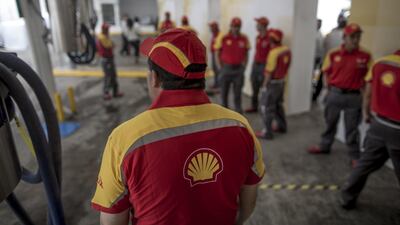Royal Dutch Shell, the world's largest oil trader, will exit Iraq’s Majnoon oilfield, relinquishing its 45 per cent stake in “due course”, as it looks to focus on its gas and petrochemicals projects in the country. The move is likely to delay the expansion of the field and slowdown the country's production.
“Following extensive discussions with the Ministry of Oil, the oil minister of Iraq formally endorsed a recent Shell proposal to pursue an amicable and mutually acceptable release of the Shell interest in Majnoon, with the timeline to be agreed in due course,” a Shell spokesman said.
The company said that it remains committed to the country, but will look to increase its position in its joint venture with the Iraqi government, known as the Basrah Gas Company (BGC). The spokesman said: “By leaving Majnoon, Shell will be in a stronger position to focus its efforts on the development and growth of the Basrah Gas Company and the Nebras Petrochemicals Project.”
As a result of Shell's exit, target production capacity of 5.0mn barrels a day (bpd) by the end of 2017 will fall short, according to BMI Research. Current output at the field is 235,000bpd, with a 400,000bpd target by 2020.
Saad Al Haditihi, spokesman for Iraqi Prime Minister Haider al-Abadi declined to comment when reached by The National, saying the issue was not political and concerns the oil ministry. Iraqi Oil Minister Jabar Ali Al-Luaibi and Assem Jihad, the Iraqi Oil Ministry spokesman were not reachable by phone.
Disagreement over the contract terms underpins Shell's decision to leave Iraq, said Edward Bell, a commodities analyst at Emirates NBD.
“I’d imagine any negotiation would have been trying to get more revenue allocated to the government over the company and Shell may have decided it was no longer commercial,” he said.
This creates a tussle between the international oil companies demanding higher remuneration and Baghdad wanting further payment reductions to help offset lower oil prices.
“Shell has also mentioned that Baghdad started to apply a performance penalty to the Majnoon remuneration fees in May, which implies the returns have been cut and that has triggered Shell’s exit,” said Richard Mallinson, geopolitical analyst at UK-based Energy Aspects.
In addition, the oil company is looking to sell its stake in the West Qurna 1 field.
_______________
Read more:
Shell and Inpex race in $180bn Australian LNG project
Oil producers ponder up to six months of further cuts next year
_______________
Shell’s chief executive, Ben van Beurden, has been steering the company’s direction to focus more on gas since taking charge in 2014 coupled with the merger with BG.
Basra Gas Company was started in 2013 to treat natural gas that was previously flared. At the end of 2014, the company was processing 500 million standard cubic feet of gas per day with a liquefied petroleum gas (LPG) production record of 2,650 tonnes per day.
Iraq produces around 1 billion cubic feet of gas per day, but 70 per cent of that was flared due to a lack of infrastructure. Shell said that if it could take that flared gas and convert it into electricity, it would generate about 4.5 gigawatts which could supply power to three million homes. That also translates to US$3.5 billion into Iraq’s economy annually.
“Divesting the stakes in Iraqi oil fields would fit with these plans, although the fruitless negotiations with Baghdad were no doubt a factor in why Shell is looking to unload these particular assets,” said Mr Mallinson.
It remains unclear how Baghdad will address the exit of Shell. Russian and Asian national oil companies could step in and replace Shell. Finding foreign investors willing to invest in expanding output from southern fields according to the Iraqi government's commercial terms in the current low oil price environment will remain challenging.
“China’s CNPC is moving ahead with the Halfaya Phase 3 expansion, which is due online next year, after securing some concessions about repayment of expenditure, but that is the only major upstream project that appears to be moving ahead in the federally controlled parts of Iraq,” Mr Mallinson pointed out.
Contracts in the Kurdistan Regional Government (KRG) offer companies more attractive terms in addition to the regular payments that have been forthcoming.
“On paper the terms of these contracts are much more attractive than the model used in the south. But investors remain concerned about the financial stability of the KRG given the low oil price, particularly as the referendum could trigger renewed political tensions with Baghdad and thereby destabilise the fragile situation that current prevails,” Mr Mallinson said.

